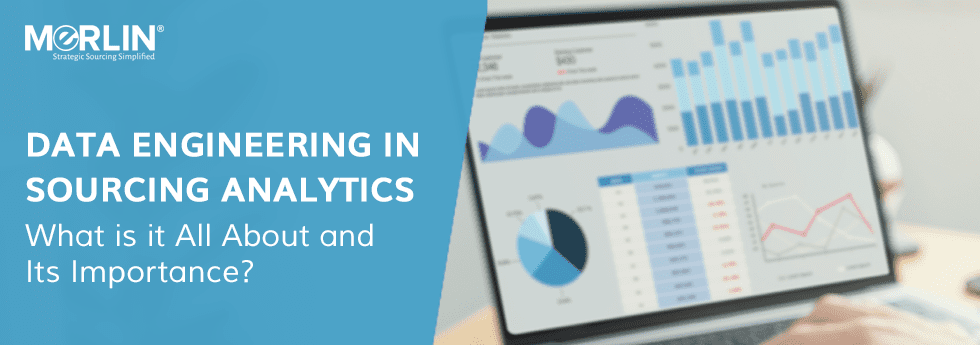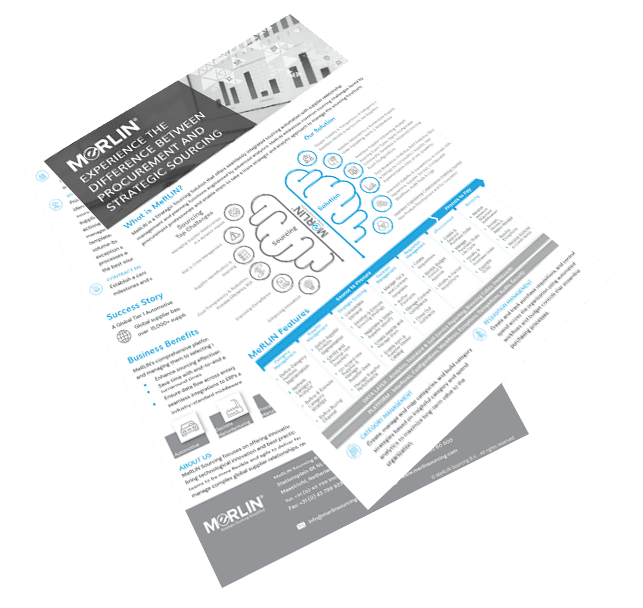
Significance of Data Engineering in Sourcing Analytics
Uncover the role of data engineering in sourcing analytics, overcome data challenges and explore the need for a unified sourcing solution.
Solutions
Create, Manage and Map Categories
Analytics, Reports, Dashboards, Cubes and much more
Register, Onboard and Manage Suppliers
Achieve LkSG compliance with MeRLIN
Never miss a critical contractual milestone
Streamline P2P processes with Workflows, Awards, POs, Supply Management & Receiving
Manage the Complete Lifecycle from RFx to Sourcing
Enable Sourcing Strategy Execution by Creating, Managing and Reviewing Projects with Multiple Stakeholders
Use Cases
Engineering Collaboration, PLM, ERP Integration, Demand Consolidation
Deep Dive into Spend Patterns for Greater Savings
End to End Solution for R & D establishments
Complete Lifecycle Management of Contracts - Creation, Authoring, E-Signature and Contract Milestones
Comprehensive Source to Procure Solution
Analyse Cost, Spend, Suppliers etc. Create Custom Reports & Dashboards
Analyse Cost, Spend, Suppliers etc. Create Custom Reports & Dashboards
Drive Cost Savings & User Adoption
Manage all your contracts from a single repository
Manage end-to-end contract lifecycle from a single platform
Add contractual milestones and keep track of them

MeRLIN’s Contract Management Solution provides an intuitive user interface to create, search and manage all your contracts easily and stay on top of them always. This results in increased regulatory compliance and a more efficient supplier management process

Strategic Sourcing Simplified
Quickly create contracts by using approved templates from the library, edit collaboratively using comments and track changes, send for approvals using automated workflows and eSign the contracts online
Get complete visibility with a centralized contract repository software having information on all executed contracts
Improve compliance with alerts and notifications on key contractual milestones to all the stakeholders
View purchase orders of the contracts, pricelists, spend visualizations, notifications history, stakeholders and more
Access your contracts and manage them easily using the intuitive user interface
Manage expiry and renewals more efficiently, avoid last minute decisions
Avoid errors due to manual entry, import or export contract details

Uncover the role of data engineering in sourcing analytics, overcome data challenges and explore the need for a unified sourcing solution.

Leverage analytics to maximize procurement efficiency and unlock untapped opportunities with key insights on spend, suppliers and categories.

Simplify strategic sourcing complexities and make smarter purchase decisions through value optimization in procurement functions.
Uncover meaningful insights from your sourcing data and trends that translates to new opportunities for savings and growth.

Contract Lifecycle Management (CLM) involves all processes for the end-to-end management of activities related to contract creation and modification, execution, and management. The contract lifecycle is a seven-stage process:
Contract Management is a critical step in procurement as it’s the contract that defines your relationship with your suppliers, vendors or service providers. Effective Contract Management in procurement helps to ensure suppliers and buyers adhere to their agreed contractual obligations and it allows for negotiating any future changes that need to take place. Contract Management in procurement helps to ensure products/services are bought at the negotiated and agreed-upon price, they are delivered on time, regularly assess if the purchases made conform to quality standards, and so on. Managing contracts in procurement involve the following processes:
Contract Management is an important part of any organization’s sourcing and procurement process. Here are some Contract
Management best practices that can help increase the efficiency of sourcing and procurement functions, minimize expenses and improve the company’s performance:
Procurement Contract Management software can provide end-to-end visibility by allowing contract data to be standardized at the organizational level, as well as monitoring and managing contract terms, and providing vital supplier information.
Comparing and manually assembling supplier offers can be time-consuming. By automating the process of negotiation and supplier identification, best practices for achieving the desired results may be realized.
Adopting a centralized contract repository can help procurement teams conveniently manage contract data. Contract digitization helps reduce operational expenses and increase productivity.
Increasing the possibilities for further savings and operational effectiveness in the sourcing and procurement departments can be done by establishing expenditure transparency.
Developing a positive connection with a supplier can help organizations in obtaining supplies during difficult times, resolve and negotiate contract disputes easily.
To increase the value of your Contract Management system during the procurement process, keeping track of the three most important KPIs – contract effectiveness, contract risk and contract efficiency is essential.
It is critical to audit contracts regularly to monitor contractual performance and detect any risks across company agreements.
Procurement software when integrated with a Contract Management solution can centralize bidding processes, Contract Management processes, and contract records as well as help in tracking the vendor contract expenditure for the procurement budgets.
Contract Management software allows you to easily handle all components of a contract in one location. There are several advantages of using digital contracting:
Contract Management software provides several features and advantages that can assist in tracking and managing the complete contract lifecycle, starting from contract initiation to post-execution compliance tracking. Some of the essential features that must be present in Contract Management software are:
Contract repository software is a centralized location for the storage of contracts. The following are the major features that should be present in contract repository software:
Error: Contact form not found.

Vetri celebrated three years as CEO of MeRLIN Sourcing in June 2023. His vision spearheaded the transformation of the company internally through modernization and HR transformation and externally with the promise of delivering value to customers and putting them at the heart of the MeRLIN Sourcing business and product development strategy.
Vetri built his career in global software businesses over the last decades. Seasoned professional with a global perspective, spanning the Americas, Europe, and Asia, and a diverse industry background across EPC, Defense, manufacturing, automotive, and life sciences industries.
A firm believer in the principles of doing well by doing good, he won his two awards as the IT Executive of 2014-2015 and 2016-2017 in Europe. He is a highly regarded global thought leader in the IT and cloud software industries and is an active investor/advisor for emerging companies. He is known as a leader who builds and motivates world class teams, champions diversity, and exudes a deep passion for how technology can transform the workplace and empower individuals.

Dr. Werner Breuers completed his studies in chemistry at the RWTH Aachen University with a doctorate. He began his professional career in 1989 as a chemist at Hoechst AG in Frankfurt in the research and development department.
After managerial positions at Hoechst AG, Dr. Breuers took over management of the license and catalyst business at the polyethylene manufacturer Elenac GmbH in Kehl in 1999, which became part of the Basell group a year later. As a member of Basell’s Executive management team, he headed the global Technology Business division based in Milan and most recently served as President of Basell Polyolefins Europe based in Amsterdam.
Dr. Breuers has also been a member of the Board of Management of LANXESS AG since May 14, 2007 and was responsible for the Performance Polymers and Advanced Intermediates business units. His responsibilities and strategic operations also include the functional areas of Global Procurement & Logistics, Innovation & Technology and Industrial & Environmental Affairs. He has been board of several other companies and has also served as trustee of RWTH Aachen University and currently advising and supportinfg the growth of MeRLIN Sourcing in Europe.

Oliver Scheffert is an experienced entrepreneur with a successful completed doctoral program in business administration and a master’s degree in International Business Studies. He held management positions at Microsoft for nearly 13 years, receiving prestigious awards for exceptional leadership and results like the Circle of Excellence Platinum Award. Notably, Oliver led the ISV business unit in Germany to a billion-dollar revenue stream.
He later served as the General Manager/Managing Director at Aparavi Software Europe GmbH and recently founded CNSLT Partners GmbH, a strategy and management consultancy, leveraging his extensive specialist knowledge to help IT companies achieve lasting success.